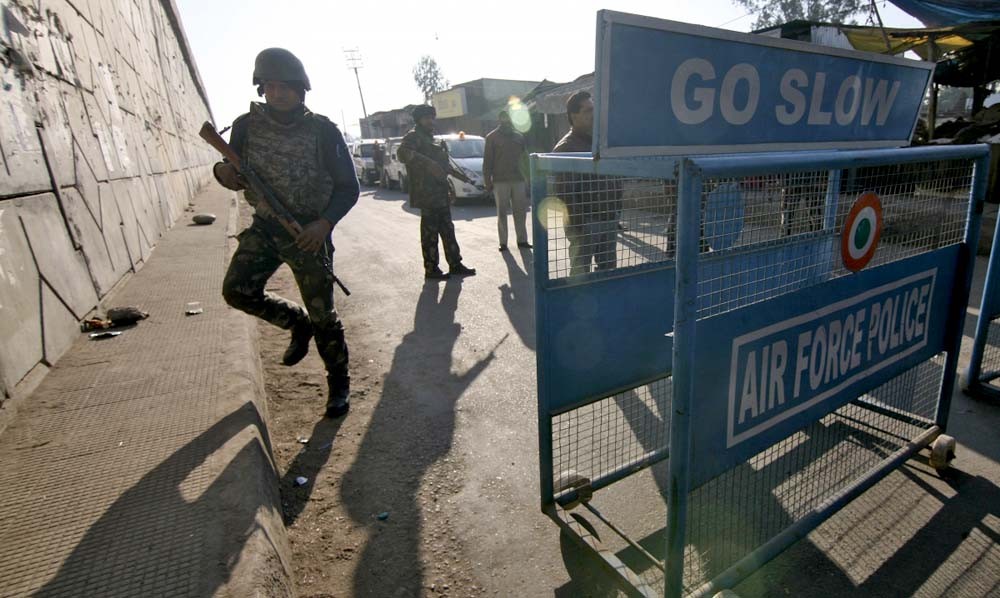
Pathankot is yet another litmus test as to which side of history Pakistan will choose to stand on

Whenever US President Barack Obama and his Indian counterpart, Narendra Modi meet, Pakistan always comes up. And usually not in a good light. True to form, a joint statement issued after the latest meeting between the two rekindles the pressure on Islamabad to take action against those responsible for the Pathankot terrorist attack in India earlier in the year, that left at least seven security personnel dead.
However, just last week, in an interview with a local tv channel, Sharad Kumar, the Director General of India’s National Investigation Agency (NIA), cleared Islamabad of any complicity with the attackers, stating there was "no evidence to show that Pakistan government or Pakistani government agency was helping Jaish-e-Mohammad or Masood Azhar or his aides to carry out Pathankot attack".
This statement opened floodgates of criticism inside India, with Delhi’s Chief Minister, Arvind Kerjiwal, going so far as to tweet that "No other PM in the history of independent India knelt before Pakistan like this".
The clean chit statement was misread in India, says Praveen Swami, the National Editor, Strategic and International Affairs, at The Indian Express. "What the Director of the NIA said, was a statement of fact: that there was no evidence that state entities in Pakistan were involved in the attack".
The real issue, however, was the lack of action against the JeM, despite admission of their involvement. In February, Sartaj Aziz, the advisor to the Prime Minister on Foreign Affairs revealed that one of the mobile phone numbers linked to the Pathankot attackers had been traced to the JeM’s headquarters in Bahawalpur. From this, Swami feels, it can be inferred that the group (JeM) is being protected by powerful elements in Pakistan’s establishment.
It seems, he may not be too far from the truth.
Last month, Punjab Law Minister Rana Sanaullah let out an open secret -- that legal action against certain militant groups, including the JeM is not possible, as "the state itself is involved". What the Law Minister was pointing at was that, for decades now, Pakistan has nurtured certain actors and groups to further its strategic aims, on both sides of the border.
Now, with Obama also backing Modi’s calls for action against the JeM, can one expect anything from Islamabad?
"The short answer, is no," says security analyst Ayesha Siddiqa. Instead, she feels, "Pakistan has reverted to its usual tactic of muddling the affair, and bringing in inaction on the Samjhota Express case as well. The problem is that Pakistan’s India (and Afghan policy) is not run from Islamabad, but Rawalpindi. By not tackling the issue, we are further isolating ourselves in the region, something that even the Chinese are unhappy about".
Of late, even China, the epitome of the exclusionary, isolationist state, has opened its doors and reached out to many countries, including Myanmar.
Coming back though, it is clear that the Pathankot incident is not going away, and has become a major roadblock for the Indian Prime Minister, both within his political party, the BJP, and outside as well. "Modi believes that in Prime Minister Nawaz Sharif, he has a partner with whom real progress can be made, even on reviving the dialogue on Kashmir that stalled after Pervez Musharraf," says Swami.
At the same time, "he’s also aware that there are risks to pushing forward -- specifically, the political damage that comes with terrorist attacks". Still, Swami feels that Modi could ride out this storm, if Pakistan was seen to be acting against terrorism directed at India.
The problem, however, is Nawaz Sharif. Not as a person, but as a political leader -- "he just doesn’t have the capacity to challenge the establishment when it comes to India," says Siddiqa. To her, Pakistan’s inability to achieve peace with India is because of a one-track mind on Kashmir. "Building ties with India doesn’t mean you let Kashmir go".
Multi-track diplomacy, she feels, is the way forward.
To be fair, successive governments in Islamabad have tried to mend ties with India. Tried and ultimately failed. Siddiqa feels the best way forward, under these circumstances, is to have two parallel dialogues on the topic -- "internally, between the civilians and the military, but more importantly, between the Indian government and the Pakistani military. We just don’t know what they [the establishment] want."
In 2010, Pulitzer prize winning journalist Steve Coll, currently serving as the Dean of the Columbia Journalism School, gave an interview to an Indian newspaper in which he stated that "everybody in Pakistan knows that India’s prosperity is the big story of the region in the next 20 to 30 years. Pakistan can either be an impediment to that or be a part of it".
Coll’s words are still true.
Swami feels that the Indian Prime Minister "understands that conflict will disrupt his big-picture economic objectives, but now perhaps feels he can’t take the political risk of walking further without some assurances on terrorism".
Which brings the focus right back on Pakistan and its notoriously sad record of not taking action against terrorists in its own backyard.
Pathankot is yet another litmus test of which way Pakistan intends to go, not only with regards to relations with India, but with its relationship with certain terrorist groups, and the use of violence as state policy.